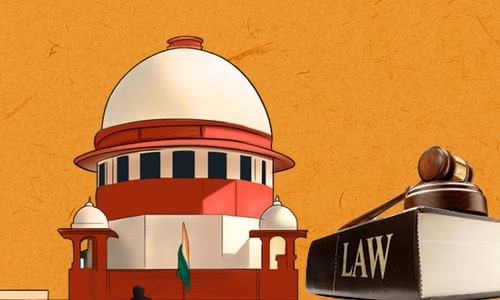The Supreme Court on Tuesday set aside the Allahabad High Court ruling striking down the Uttar Pradesh Board of Madarsa Education Act, 2004, holding that the law is consistent with the "positive obligation" of the state government to ensure that students studying in recognised madarsas attain a level of competency which will allow them to effectively participate in society and earn a living.
A bench, headed by CJI D.Y. Chandrachud, said that the Allahabad High Court erred in holding that the Madarsa Education Act, 2004, was bound to be struck down for violation of the basic structure and principles of secularism.
"The entire statute does not need to be struck down each time that certain provisions of the statute are held to not meet constitutional muster. The statute is only void to the extent that it contravenes the Constitution," it said.
The Bench, also comprising Justices J.B. Pardiwala and Manoj Misra, held the Madarsa Education Act "unconstitutional" to the extent it regulates higher education in relation to the 'Fazil' and 'Kamil' degrees for being in conflict with the UGC Act. "The only infirmity lies in those provisions which pertain to higher education, namely Fazil and Kamil and these provisions can be severed from the rest of the Madarsa Act," it held.
It added that if the provisions relating to higher education are separated from the rest of the statute, the Madarsa Act can continue to be enforced in a real and substantial manner.
"Thus, only the provisions which pertain to 'Fazil' and 'Kamil' (degrees) are unconstitutional, and the Madarsa Act otherwise remains valid," the SC ruled.
Further, it held that Article 21-A of the Constitution and the Right of Children to Free and Compulsory Education (RTE) Act, 2009 have to be read consistently with the right of religious and linguistic minorities to establish and administer educational institutions of their choice.
"The Board, with the approval of the state government, can enact regulations to ensure that religious minority institutions impart secular education of a requisite standard without destroying their minority character. The Madarsa Act is within the legislative competence of the State legislature and traceable to Entry 25 of List III," the Supreme Court said.
Earlier in April, staying the impugned decision, it had observed that the Allahabad High Court misconstrued the provisions of the Madarsa Act and the view taken by it was prima facie not correct.
Delivering a verdict on a public interest litigation (PIL) filed by an advocate challenging vires of the Madarsa Act, 2004, the Allahabad HC, in its March 22 order, had held the law violative of the principles of secularism, Articles 14, 21, and 21-A of the Constitution of India and Section 22 of the University Grants Commission Act, 1956. It had asked the Uttar Pradesh government to take steps to accommodate students of such institutions in regular schools, adding that if required, new schools would be established to ensure that children between the ages of 6 to 14 years are not left without admission in duly recognised institutions.




Patanjali boosts Oil Palm expansion in Tripura
In a strategic push to enhance oil palm cultivation in Tripura, Patanjali Foods has announced its plan to cultivate approximately 10,000 hectares of oil palm over the next two years. The initiative aims to strengthen the region’s agricultural economy and make Tripura a key player in India’s oil palm production.
Rs 14 Crore sanctioned for Brahmakunda Mela Development: CM
Chief Minister Prof. Dr. Manik Saha today said that the present state government has been working for the protection of the culture and tradition of the indigenous people of the state.
Young biker dies in road accident near Tripura University
In a heart-wrenching road accident, a young biker lost his life after colliding with a lorry on the Agartala-Sabroom National Highway in front of the main gate of Tripura University under Amtali police station jurisdiction today.
Centre approves Vibrant Villages Programme-II for Tripura
The Union Cabinet chaired by the Prime Minister Narendra Modi, today approved the Vibrant Villages Programme -II (VVP-II) for Tripura and rest of the North Eastern states.
Assam farmers visit Tripura to learn advanced onion farming techniques
A group of 18 farmers from Assam has arrived in Tripura to study the state’s successful onion farming initiatives. Organized by the Department of Agriculture and Horticulture in collaboration with Tripura Agricultural College and NABARD, this exposure visit aims to highlight modern agricultural techniques that have contributed to Tripura’s impressive onion yields.
Manipur Police arrest 11 militants, recover large cache of arms, ammunition
The Manipur Police arrested 11 militants belonging to various banned outfits and recovered a large cache of arms and ammunition during the past 24 hours, officials said here on Friday.
PM Modi unveils 21-point action plan at 6th BIMSTEC Summit
Prime Minister Narendra Modi on Friday presented a comprehensive 21-point action plan during the sixth BIMSTEC Summit in Bangkok, laying out an ambitious road map for cooperation across diverse sectors.
ED raids multiple premises of 'Empuraan' producer Gokulam Gopalan
Amid the controversy surrounding Malayalam film ‘Empuraan’ starring superstar Mohanlal, the Enforcement Directorate (ED) on Friday conducted raids at multiple premises linked to film’s producer Gokulam Gopalan.